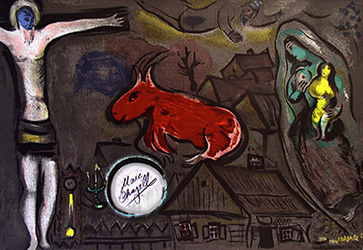Torah: Devarim (Deuteronomy) 16:18 – 21:9; Haftarah: Yesha'yahu (Isaiah) 51:12 – 52:12
Yeshua our Judge, King, and Priest
This Parashah begins with commandments directed to the leaders of the nation: the judges, the kings and the priests, because their conduct has a powerful influence on the rest of the people, for good or for bad, just as it is today.
It begins with the judges: “Judges and officers shall you appoint in all your gates, which the LORD your God gives you, throughout your tribes; and they shall judge the people with just judgment. You shall not pervert judgment; you shall not respect one person above another, nor take a bribe; for a bribe blinds the eyes of the wise, and perverts the words of the righteous. Justice, justice shall you pursue - Tzedek, tzedek tir'dof - that you may live, and inherit the Land which the LORD your God gives you” (Devarim 16:18-20).
Tzedek, tzedek tir'dof. The Hebrew word “tzedek” is the root word for two other words: "tzedakah," or righteousness - but commonly used today as "charity" - and for “tzadik,” meaning a righteous man. These words imply that doing the right thing is doing a righteous act, either in giving money or giving justice. Because God used the word twice to teach this Torah, the sages concluded that one should pursue righteousness only through righteousness. That is, it is not enough to just seek justice; one must pursue to do justice only through righteous means. For every incident must exist the testimony of at least two witnesses and, back then, those witnesses were to be the first to execute the judgment. God does not approve the pursuit of justice through improper means - the end does not justify the mean. Justice is strong enough, divine enough, to triumph without itself resorting to injustice. Justice is the basis for all ethical qualities in God: "Righteousness and just judgment are the foundations of His throne," says the Psalmist (97:2), and this quality should also be in man because man is created in His image.
Where there is no justice — no proper appreciation of the rights of every human being — there is negation of God. The oppressor, the man who tramples on others, is throughout Scripture portrayed as the enemy of God. However, justice is more than mere abstention from injuring our fellowmen; it is an active search to do good. "The work of justice is peace; and the effect thereof, quietness and confidence forever" Isaiah 32:17. It is a positive concept, and includes charity, philanthropy, and every endeavor to bring out what is highest and best in others. Just as "truth" is usually preceded in Scripture by "loving-kindness," to remind us that the truth must be spoken in love, even so is "justice" often accompanied by some synonym of "loving-kindness" to teach that strict justice must, in its execution, be mitigated by pity and humanity. We are sinful people and could not exist if God would impart the justice that we deserve; therefore, God judges us by justice tempered with mercy, and we should do the same. "To do justly and to love mercy," is the Prophet's summing up of human duty towards his fellowman.
Next, the Parashah describes the qualities of the king. This Torah portion foreshadows the improper motive of the people’s request for a king, “like all the nations.” They should have asked for a king who would inspire them and set an example of selfless and wholehearted service to God, but instead they wanted a king merely to imitate their neighbors, for glory, wealth and conquest. Because the desire of the people was wrong, their first king, Saul, could not keep his throne permanently and instead was given to David.
“When you come to the land which the LORD your God gives you, and shall possess it, and shall live in it, and shall say, ‘I will set a king over me, like all the nations that are around me.’ You shall set him king over you, whom the LORD your God shall choose; one from among your brothers shall you set king over you; you may not set a stranger over you, who is not your brother. And it shall be, when he sits upon the throne of his kingdom, that he shall write for himself a copy of this Torah in a scroll from that which is before the priests the Levites. And it shall be with him, and he shall read in it all the days of his life; that he may learn to fear the LORD his God, to keep all the words of this Torah and these statutes, to do them. That his heart be not lifted up above his brothers, and that he turns not aside from the commandment to the right hand, or to the left; to the end that he may prolong his days in his kingdom, he, and his children, in the midst of Israel” (17:14-20).
If we take the words “write for himself” in their literal meaning, what an awesome image must have been of the king writing a Torah for himself. Regardless of the text being literal or not, the king should have read from the Torah every day of his life and in everything he would do he was to be guided by it. He should have had no other authority save what the Torah commanded him. What a great example for his people, but also for us. We must make time out of our busy daily schedule to read the Bible but not in a mechanical way which derive no benefit, but with thought, prayer and meditation for we know nothing about God except from the Bible and we want to know more about Him and His holiness because He asked us to strive, to hunger and thirst for His righteousness, for a holy life style, “be holy for I am Holy,” pleads our God.
The Torah continues with the Kohanim, the priests, who are the teachers of the Torah. They are not given a portion of the land so that they can devote themselves exclusively to spiritual activities. The Torah provides for their livelihood by assigning them gifts from the rest of the people. “The Kohanim, the Levites, and all the tribe of Levi shall have no part nor inheritance with Israel; they shall eat the offerings of the LORD made by fire, and His inheritance. Therefore, shall they have no inheritance among their brothers; the LORD is their inheritance, as He has said to them” (18:1-2).
They would have no riches or fame; they would live exclusively to serve the people, for their inheritance was neither silver nor gold, but the LORD. Again, what an awesome example for the pastors and rabbis of today of a lifestyle dedicated in serving God, a total dedication in serving other people.
But all these images are foreshadows of the ultimate Judge, King, and Priest, Moshiach Yeshua, announced by Moshe himself: “The LORD your God will raise to you a Prophet from your midst, from your brothers, like me (Moshe); to Him you shall listen. According to all that you desired of the LORD your God in Horeb in the day of the assembly, saying, ‘Let me not hear again the voice of the LORD my God, neither let me see this great fire anymore, that I die not.’ And the LORD said to me, ‘They have well-spoken that which they have spoken. I will raise them a Prophet from among their brothers, like you, and will put My words in His mouth; and He shall speak to them all that I shall command Him’“ (18:15-18).
"To Him you should listen," says God. Let us therefore listen to Yeshua, the ultimate Priest - our heavenly High Priest - who came into this world “not to misinterpret the Torah but to interpret it correctly” [Matthew 5:17] and was called “Teacher” - a great honor - by the greatest minds of that era, but He had no riches, no place to rest His head.
Listen to Yeshua, the ultimate King, to which “every knee shall bow,” but who had no kingdom on this world and was mocked and crucified for announcing that “the Kingdom of God is at hand.” Indeed, if you make Him your King, if He reigns in your heart, He is at hand.
And listen to Yeshua, the ultimate Judge, who will judge in the world to come every human being for what they done, good or bad. But first, He came into this world not to judge but to love us and to die as a ransom for our sins, paying for the just penalty due us.
Yeshua emptied Himself so we may be filled. Our earthly leaders - judges, kings and priests - may fail us, but if we keep our eyes focused on our Righteous Shepherd, He will never leave us nor forsake us, for “a bruised reed He will not break and a dimly burning wick He will not extinguish; He will faithfully bring forth justice.”
Shabbat joy, peace, and blessings! Shabbat Shalom!





